
MYCOSCIENCE
Scope & Guideline
Empowering Researchers with Cutting-Edge Mycological Insights
Introduction
Aims and Scopes
- Fungal Taxonomy and Systematics:
A core focus of MYCOSCIENCE is the description and classification of new fungal species, utilizing morphological characteristics alongside molecular phylogenetic methods to deepen understanding of fungal diversity. - Ecological Interactions and Biodiversity:
The journal examines the ecological roles of fungi, including their interactions within ecosystems, their relationships with plants (e.g., mycorrhizal associations), and their contributions to nutrient cycling. - Applied Mycology:
Research on the practical applications of fungi, including their use in food production, bioremediation, and pharmaceuticals, is a significant aspect of the journal, showcasing the relevance of mycology to societal needs. - Fungal Pathology:
The study of fungal pathogens affecting plants and animals, including their life cycles, pathogenic mechanisms, and control measures, is a critical area of research published in MYCOSCIENCE. - Mycological Techniques and Methodologies:
The journal promotes innovative methodologies in mycology, such as molecular techniques (e.g., PCR, DNA barcoding) and imaging techniques that enhance the study of fungal life cycles and reproduction.
Trending and Emerging
- Molecular Phylogenetics and Genomics:
There is an increasing trend in applying genomic techniques to resolve phylogenetic relationships among fungi, which enhances understanding of evolutionary processes and species delineation. - Fungal Ecology and Climate Change:
Emerging studies focus on the impact of climate change on fungal communities and their ecological roles, highlighting the importance of fungi in ecosystem responses to environmental changes. - Mycoheterotrophy and Plant-Fungal Interactions:
Research on mycoheterotrophic plants and their symbiotic relationships with fungi is gaining traction, emphasizing the complex interactions that sustain biodiversity in various ecosystems. - Fungal Metabolites and Bioprospecting:
There is a growing interest in exploring fungal metabolites for their potential applications in pharmaceuticals, agriculture, and industry, reflecting a trend towards sustainable bioprospecting. - Urban Mycology and Biodiversity Studies:
Studies examining the diversity and ecological roles of fungi in urban environments are emerging, as urbanization presents unique challenges and opportunities for mycological research.
Declining or Waning
- Traditional Morphological Studies:
There has been a noticeable decline in research relying solely on classical morphological techniques for species identification, as the field increasingly shifts towards molecular methods for more accurate and comprehensive assessments. - Fungi in Traditional Medicine:
Interest in the medicinal properties of fungi, while still relevant, appears to be declining compared to previous years, with a shift towards more diverse applications of fungi in biotechnology and environmental science. - Mycological History and Taxonomic Reviews:
Research focused on historical perspectives of mycology or extensive taxonomic reviews has seen a decrease, possibly as researchers favor original contributions and novel discoveries over retrospective analyses.
Similar Journals

Current Fungal Infection Reports
Connecting researchers to combat fungal infections.Current Fungal Infection Reports is an essential academic journal dedicated to the rapidly evolving field of mycology, specifically focusing on the diagnosis, treatment, and epidemiology of fungal infections. Published by Springer, this journal aims to provide a comprehensive platform for researchers, healthcare professionals, and scholars to disseminate groundbreaking findings and insights into the complexities surrounding fungal diseases. With an ISSN of 1936-3761 and an E-ISSN of 1936-377X, the journal is recognized in the Q3 category for Infectious Diseases as of 2023 and holds a Scopus rank of #199 out of 344 in its field, showcasing its growing influence. Although not currently open access, Current Fungal Infection Reports remains an important resource for those wishing to stay updated on key developments and trends within this critical area of global health. Through its commitment to advancing knowledge and fostering academic exchange, the journal plays a crucial role in combating the challenges posed by fungal infections, making it a must-read for anyone involved in infectious disease research and treatment.
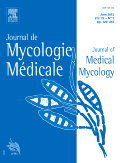
JOURNAL DE MYCOLOGIE MEDICALE
Unveiling Insights into Mycological ChallengesJOURNAL DE MYCOLOGIE MEDICALE is a premier publication in the field of infectious diseases, particularly focusing on the study of mycology and its clinical implications. Published by MASSON EDITEUR, this esteemed journal is based in France and has been disseminating valuable research since its inception in 1994. With an ISSN of 1156-5233 and an E-ISSN of 1773-0449, it plays a critical role in advancing knowledge in mycological infections, positioning itself in the Q3 category for infectious diseases as per the 2023 quartiles. As indicated by its ranking in Scopus, ranking #142 out of 344 in the medicine-infectious diseases category, the journal maintains a prominent presence within the academic community, appealing to researchers, healthcare professionals, and students alike. Although access options are not open access, the journal endeavors to promote a deeper understanding of mycological studies that are crucial for combating ongoing and emerging infectious threats. As it continues to converge on new findings up to 2024, JOURNAL DE MYCOLOGIE MEDICALE remains an essential resource for those invested in the critical intersections of mycology and medicine.

FUNGAL DIVERSITY
Fostering Knowledge on the Interconnectedness of Fungi and EnvironmentFungal Diversity is a premier academic journal dedicated to advancing the science of mycology, encompassing ecological, evolutionary, and biological research involving fungi. Published by Springer, this journal has established a significant presence in the academic community since its inception in 1998, and it continues to thrive with a convergence period extending to 2024. Holding a prestigious Q1 ranking in several categories — including Ecology, Ecology, Evolution, Behavior and Systematics, and Plant Science — Fungal Diversity showcases cutting-edge research that influences ecological management, conservation, and biodiversity studies. With its notable positions in Scopus rankings, including being ranked #1 in Environmental Science - Ecology, the journal serves as an essential resource for researchers, professionals, and students interested in the complex interplay between fungi and their environments. Although it does not currently offer open access, interested readers can benefit from the journal's rich repository of peer-reviewed articles, making Fungal Diversity a vital component of the scientific literature landscape.

Botany
Unveiling the mysteries of botanical systems.Botany is a premier academic journal published by Canadian Science Publishing, dedicated to advancing the understanding of plant sciences and ecological systems. With an ISSN of 1916-2790 and an E-ISSN of 1916-2804, this journal has established itself as a respected publication in the fields of Ecology, Evolution, Behavior and Systematics, and Plant Science, reflected in its 2023 Q2 and Q3 rankings. Covering a wide range of topics, Botany is committed to fostering interdisciplinary research, promoting innovative methodologies, and disseminating significant findings from both theoretical and applied perspectives. Based in Ottawa, Canada, the journal is open access, ensuring that high-quality research is accessible to a global audience, thereby playing a crucial role in the dissemination of knowledge in the scientific community. With convergence years from 2008 to 2024, it continues to evolve alongside the scientific advancements in botanical studies, making it an essential resource for researchers, professionals, and students alike.
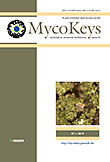
MycoKeys
Connecting researchers to the pulse of fungal science.MycoKeys, published by PENSOFT PUBLISHERS, is a leading open-access journal dedicated to advancing the understanding of fungal biology and its diverse implications within agricultural, ecological, and biological sciences. With its ISSN 1314-4057 and E-ISSN 1314-4049, this journal has achieved remarkable academic prestige, reflected in its 2023 Scopus rankings placing it in the first quartile (Q1) across several categories, including Agricultural and Biological Sciences (miscellaneous), Ecology, Evolution, Behavior and Systematics, and Plant Science. MycoKeys provides a platform for researchers, professionals, and students interested in the latest findings and methodologies regarding fungi, their environments, and their interactions within various ecosystems. Since its transition to open access in 2011, the journal has championed the dissemination of high-quality research to a global audience, fostering collaboration and innovation in mycology. With a publishing history that converges from 2015 to 2024, MycoKeys remains a vital resource for those committed to exploring the multifaceted roles fungi play in our world.
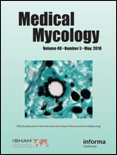
MEDICAL MYCOLOGY
Transforming Understanding of Mycological DiseasesMEDICAL MYCOLOGY, published by Oxford University Press, is a premier journal dedicated to the study of fungal infections and their clinical implications. With an ISSN of 1369-3786 and an E-ISSN of 1460-2709, this journal has established itself as a vital resource in the fields of Infectious Diseases and Medicine, holding a respectable Q2 ranking for both categories and a Q1 ranking in the veterinary sector in 2023. Spanning a rich history from 1962 to 2024, MEDICAL MYCOLOGY serves as a platform for innovative research, case reports, and review articles that contribute to the understanding and management of mycological diseases. The journal's commitment to advancing knowledge is reflected in its Scopus rank of #120 out of 344 in Medicine - Infectious Diseases, positioning it within the 65th percentile. With open access options available, it aims to ensure that critical research is accessible to a global audience, enhancing collaboration and knowledge sharing among researchers, healthcare professionals, and students alike.
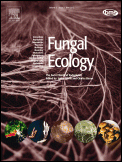
Fungal Ecology
Fostering Global Collaboration in Fungal ResearchFungal Ecology, published by Elsevier Science Ltd, is a leading international journal dedicated to the exploration and advancement of our understanding of fungal biology and its ecological significance. With an impressive impact factor and recognized in the second quartile (Q2) across various categories such as Ecological Modeling, Ecology, Ecology, Evolution, Behavior and Systematics, and Plant Science, this journal offers a critical platform for researchers and professionals to disseminate and discuss innovations in fungal ecology. Since its inception in 2008, the journal has built a solid reputation, particularly highlighted by its impressive Scopus rankings, including a top percentile status in ecological fields. Researchers are encouraged to submit their findings that contribute to the understanding of the ecological roles of fungi, their interactions within ecosystems, and their applications in environmental science. Although the journal does not offer open access, it remains a vital resource for academics and practitioners aiming to stay ahead in the rapidly evolving fields of fungal research and ecology. Located in the vibrant heart of the Netherlands, the journal continues to foster scholarly engagement and collaboration among scientists globally.
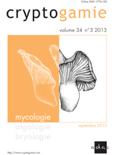
CRYPTOGAMIE MYCOLOGIE
Advancing Insights in Fungal Diversity and EvolutionCRYPTOGAMIE MYCOLOGIE is a prestigious journal published by ADAC-CRYPTOGAMIE dedicated to the study of mycology within the context of ecology, evolution, and biodiversity. With an ISSN of 0181-1584 and an E-ISSN of 1776-100X, this journal is recognized for its significant contributions to advancing knowledge in the field, holding a Q1 ranking in the 2023 Ecology, Evolution, Behavior and Systematics category on Scopus, placing it within the top tier of scholarly publications. Since its inception, with publication years converging from 1990 to 1993 and then from 1995 to 2024, it has served as a vital resource for researchers, professionals, and students alike, offering the latest findings, reviews, and methodologies in mycology. Despite being published without open access options, the journal maintains a strong academic standard and impact factor, established through a rigorous peer-review process. The journal is based in Paris, France, and aims to foster interdisciplinary research that bridges gaps between mycology and related ecological fields.
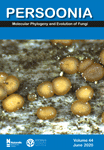
PERSOONIA
Exploring the Frontiers of Evolution and BehaviorPERSOONIA, a distinguished journal published by RIJKSHERBARIUM, serves as a pivotal platform for the dissemination of high-quality research in the fields of Ecology, Evolution, Behavior, and Systematics, as well as Plant Science. Established with a commitment to advancing scientific knowledge, PERSOONIA has achieved an impressive Q1 ranking in these areas, highlighting its significant impact within the academic community, as evidenced by its ranking of #12 out of 721 journals in its field, placing it in the top 2% of publications. With a publication history that spans from 1996 to present, the journal regularly features innovative studies that push the boundaries of understanding in ecological and botanical sciences. While Open Access options are currently limited, researchers and professionals alike benefit from subscription access to this vital resource. Located in the Netherlands, PERSOONIA continues to be a beacon for scholars aiming to enrich the discourse in evolving ecological and plant science disciplines.
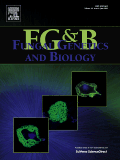
FUNGAL GENETICS AND BIOLOGY
Exploring the Genetic Mysteries of FungiFungal Genetics and Biology is a leading peer-reviewed journal published by Academic Press Inc, Elsevier Science, dedicated to advancing the understanding of fungi through innovative genetic and biological research. Since its inception in 1996, this journal has served as a vital platform for the dissemination of critical findings in the fields of Genetics and Microbiology, maintaining a distinguished Q2 category ranking in both disciplines as of 2023. With an ISSN of 1087-1845 and an E-ISSN of 1096-0937, the journal emphasizes the intersection of genetics and molecular biology to explore fundamental questions related to fungal biology that are of paramount importance to various applications in biotechnology, medicine, and environmental science. Researchers, professionals, and students alike will find this journal invaluable as it not only covers current trends and breakthroughs but also encourages collaborative efforts across the scientific community. Fungal Genetics and Biology continues to shape the future of fungal research well into 2024 and beyond, offering rich insights and open access options for a global audience.